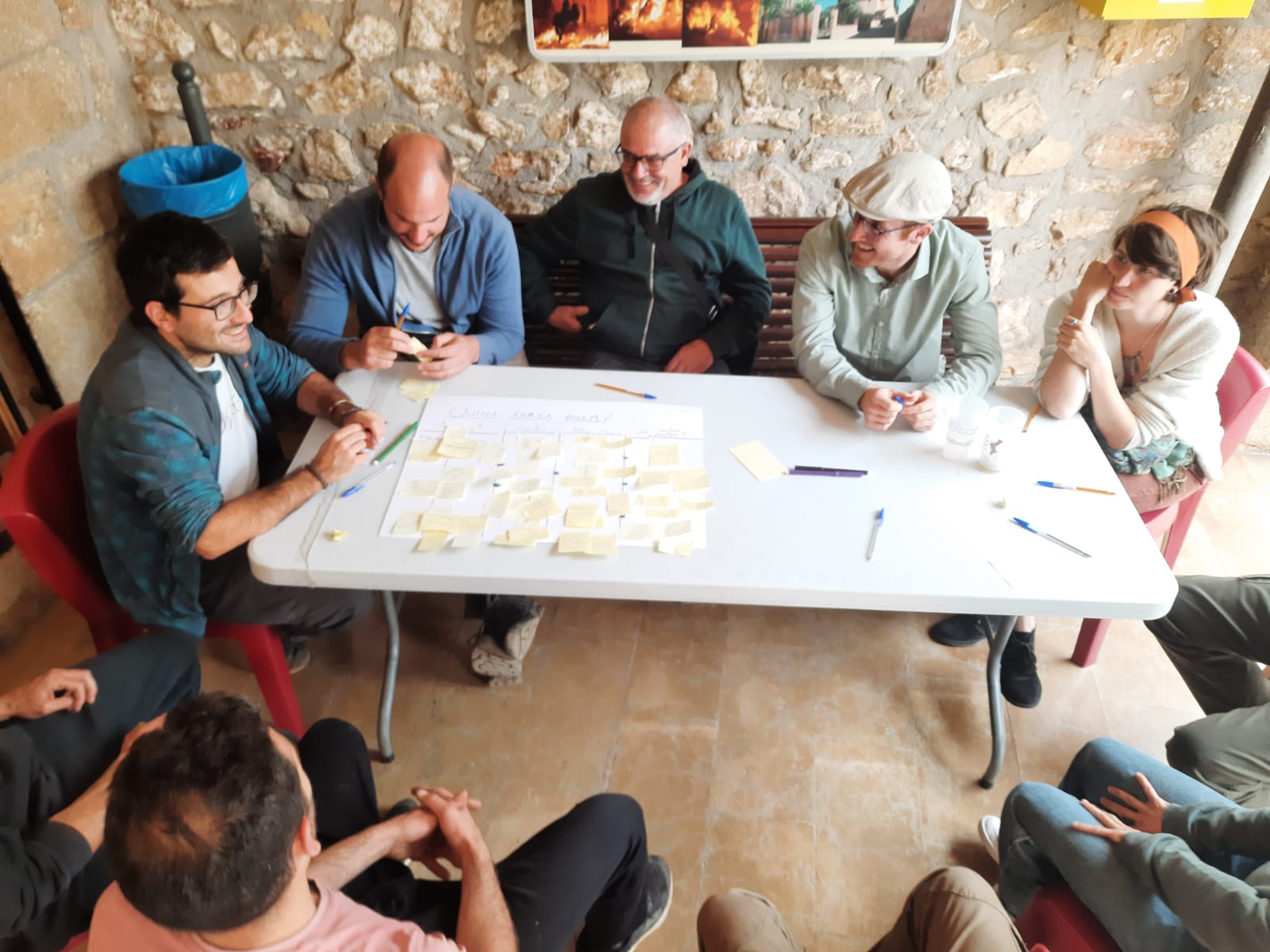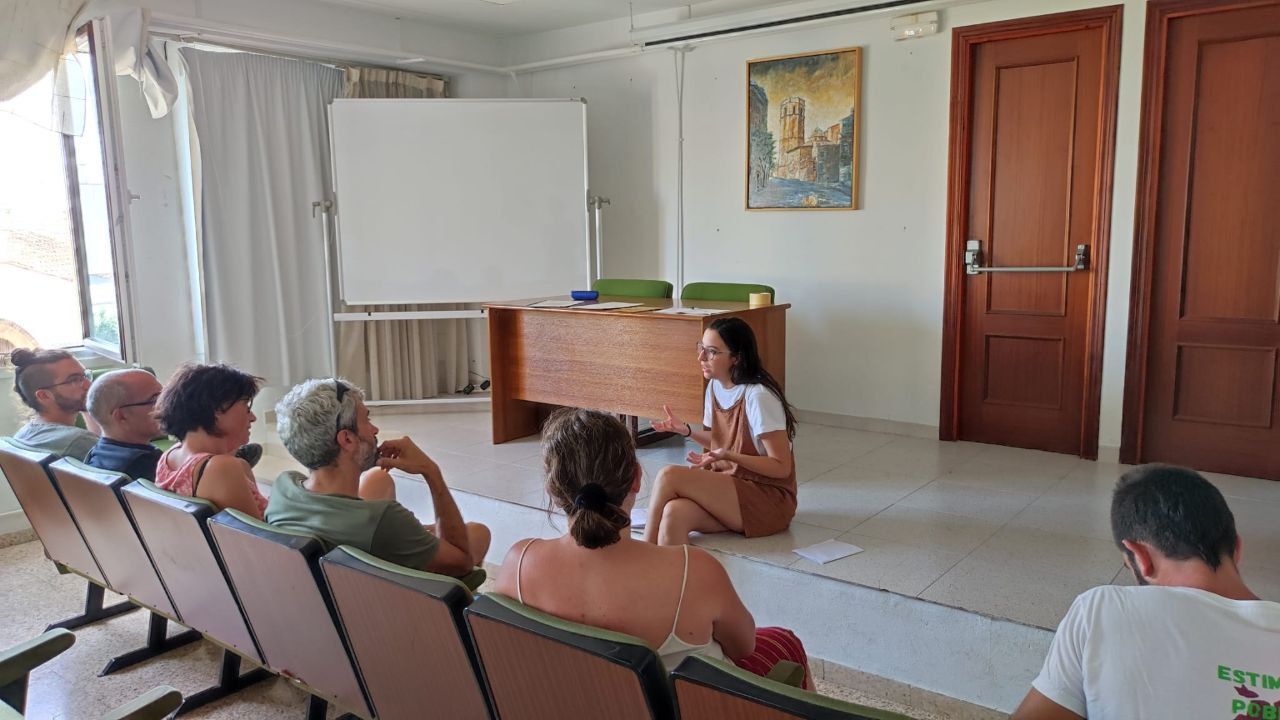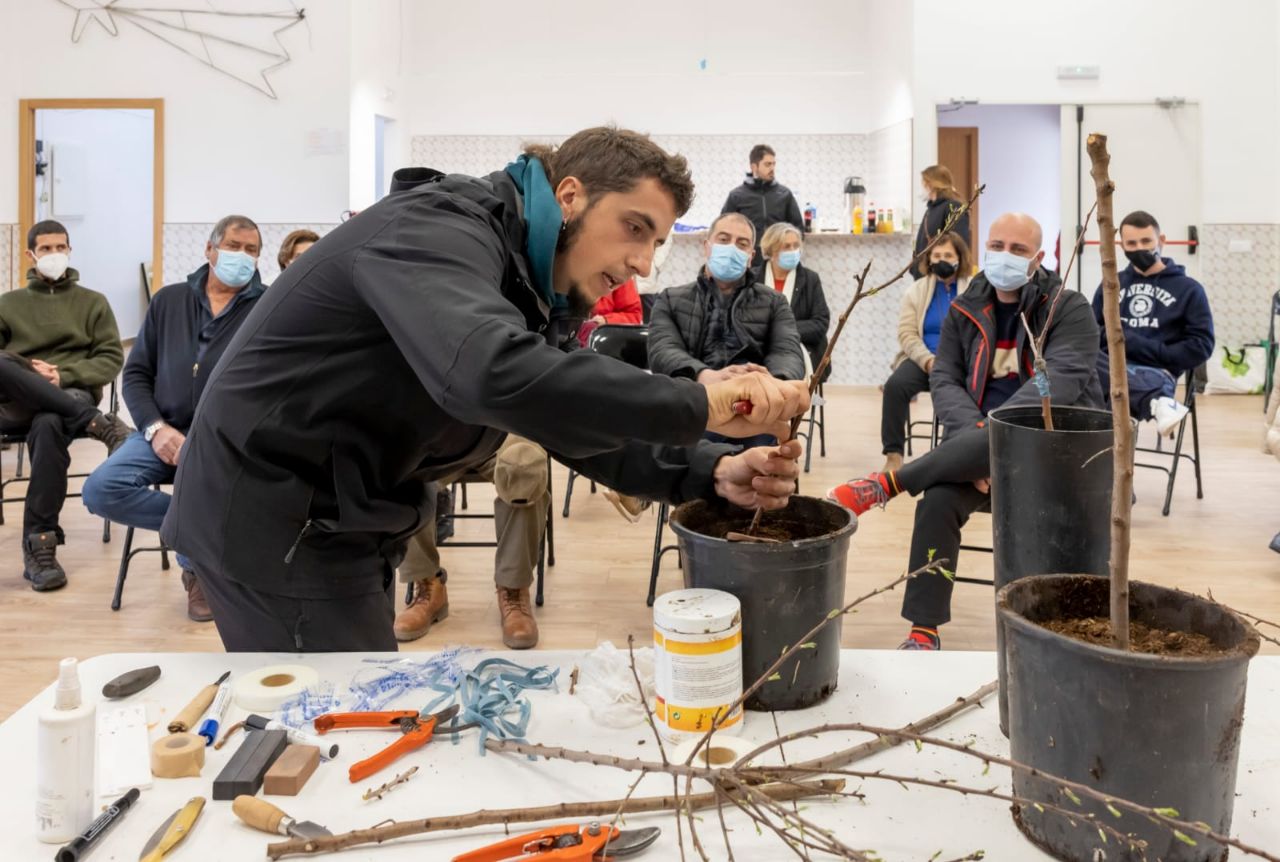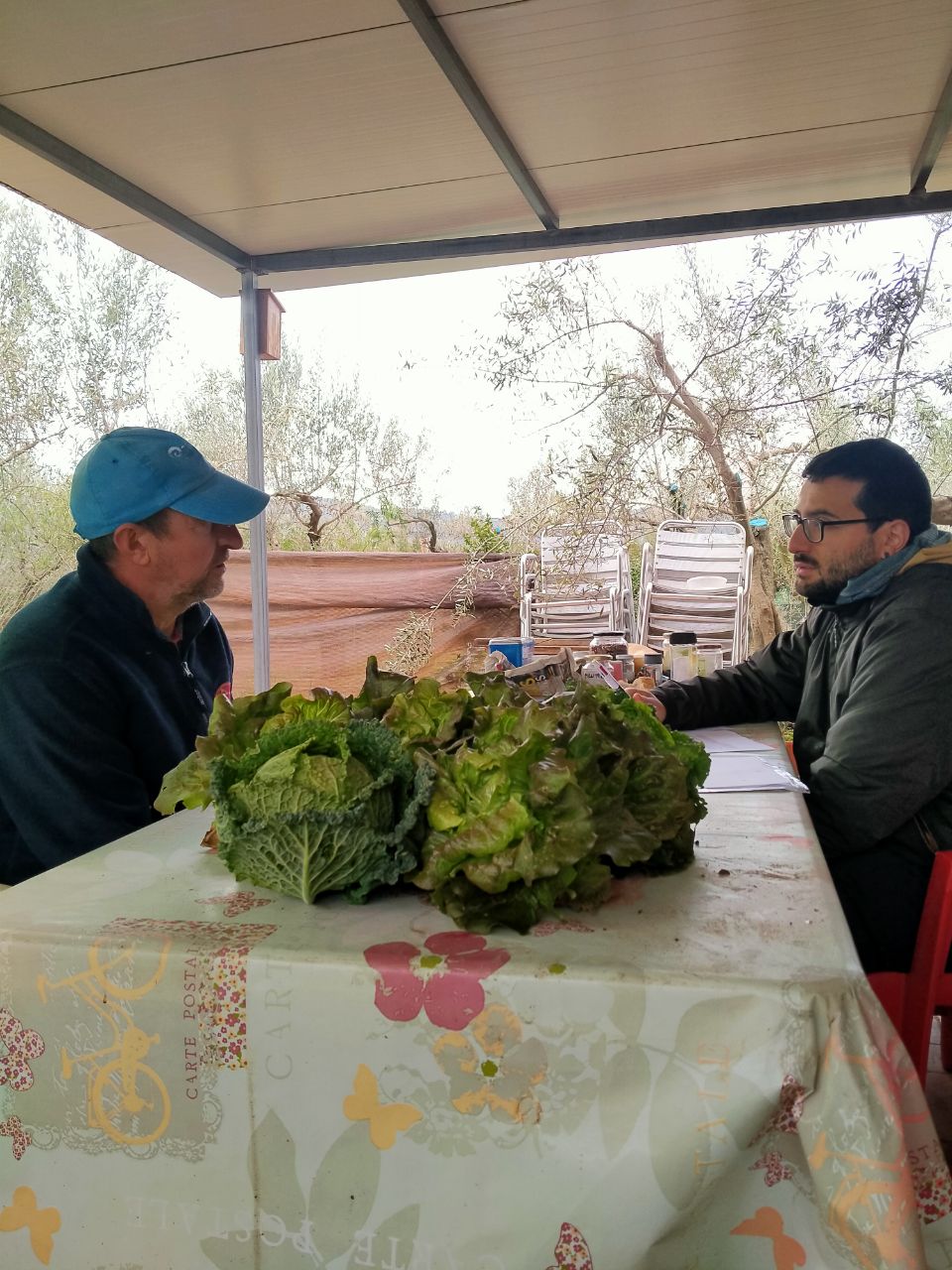Connecting Roots winner
A participatory rural Network to preserve agrobiodiversity, as a natural and cultural heritage, and foster rural dynamization.
Creators
Who is behind this?
Who is joining forces?
PEU-UJI: Programa d’Extensio Universitaria de la Universitat Jaume I (University Extension Program of Jaume I University)
https://www.uji.es/cultura/base/peu/
Spain
FEDINESPV- Federació d’Instituts d’Estudis del País Valencià (Federation of Institutes for the Study of the Valencian Region)
https://www.fedinespv.org
Spain
Formigues Liles Coop. V.
https://formiguesliles.es/
Spain
Cofunders: CDR Palancia-Mijares cdrpalanciamijares.org; Canopia canopiacoop.org Collaborations: Eslida city council; SASE serra-espada.org; Natural parks of “Serra d’Espadà” and “Tinença de Benifassà”
Idea
Idea pitch
Rural areas of Castelló province are lacking innovative initiatives that make use and take care of their heritage and help to stop depopulation. We aim to get together the rural communities in a participatory Network dedicated to recover, preserve and promote their traditional crop varieties and their associated knowledge, while studying their functionality for the dynamization of rural areas. To this end we will facilitate spaces of encounter and impart social, gender and agronomic workshops.
Where will your project idea take place?
Province of Castelló, Valencian Region, Spain
What is the specific societal challenge faced by this region?
Inhabitants of these areas are excluded from public policies and development agendas because of the urban-centric paradigm. Resulting in a decline, masculinization and aging of their population, as well as a territorial disarticulation and a lack of social cohesion within the community and between rural communities. Thus, few opportunities for civic engagement and participation are available. Moreover, this process is leading to the disappearance of traditional crop varieties (TCV) and traditional knowledge (TK). TCV & TK are a cultural heritage resulting from the local peasant labor and are important to maintain the stability of the food system and cope with climate change. Recent studies point out an alarming loss of TCV & TK and it’s urgent to implement actions for their conservation.
Who are you doing it for?
Rural communities, especially those people interested in TCV & TK preservation and their application for the socioeconomic dynamization of their territories. We define 4 target groups who are usually neglected:
Rural elderly: main keepers of TCV & TK. The transmission of their wisdom between generations will be a key point of the project.
Young people: forced to migrate to cities by the lack of opportunities. The Network will help them to reconnect with their rural identity while exploring the opportunities that they can find in their territories.
New inhabitants of rural areas: The project will enhance their inclusion in the rural communities.
Women: Their role in TCV & TK preservation has been historically invisibilized. Thus, it is necessary to highlight their role in the network.
How do you plan to get there?
The methodological approach will be participatory and feminist so as to involve a wide diversity of voices in each of the following phases:
DIAGNOSIS AND PROMOTION. Desk research and interviews with key informants to recognize the conditions and needs of each territory related to TCV & TK, compiling a list of stakeholders, initiatives and resources. 8 promotion events will be performed to raise awareness and motivate people to participate in the project. With all the information collected we will rethink the methodology and set up working groups.
LEARNING AND CONNECTING. 16 participatory workshops will be performed to provide participants with social and technical tools to organize and cooperate for working on TCV & TK preservation and revaluation with a rural development perspective. The working groups of the Network will get together in 2 events, where they will share information, create social bonds and engage with collective goals resulting from their common needs and wills
CO-CREATING A COMMON SPACE: Analyze all the information previously collected to co-create, during 3 participatory workshops, the structure, operating agreements and common goals of the Network, and decide its next steps. Co-generate protocols that enhance the participation of different social groups, focusing on women and youth. Promote the Network creating a dissemination strategy and online platform
What are the expected results?
Social cohesion: the TCV Network will get together different rural actors to collaborate in the preservation of their heritage, offering a space of encounter for them to reinforce bonds, fortifying tolerance and social cohesion.
Empowerment of rural women: feminist methodology will highlight the key role of women in rural communities.
Democratic enhancement: the TCV Network will act as a catalyst to create civic spaces and facilitate active political participation, and it will empower local communities to be political interlocutors.
Empowerment of the rural identity by revalorizing the local natural and cultural heritage.
TCV conservation: the TCV Network will contribute to increase TCV understanding and promote production and consumption, reducing their current disappearance risk.
How does your idea strengthen active citizenship at a local and community level?
Our experience suggests that TK, with the TCV as a symbolic element, can empower the identity of rural communities and encourage the engagement of different local actors, which are usually polarized. The creation of the TCV Network will generate a common civic space with shared objectives, boosting civic engagement and active participation to preserve and revalue their common heritage. Moreover, it will provide social and civic tools and skills, which in turn will foster social and political participation on the local level. In the long term, the TCV Network will boost food sovereignty and the democratization of the food system by increasing their power of decision on food production and consumption, and encouraging them to embark on local value-added agricultural projects
Why is this idea important to you?
Connecta Natura has been working since 2015 on rural development and biodiversity preservation projects, managing several demonstrative fields. Since 2018 we began to work on TK and TCV recovery and promotion, focussing on the Castelló province, cooperating with rural communities and public entities like councils, Natural Parks and research centers.
Our team is composed of experienced environmentalists and agroecologists living in the region. Our emotional bond with the territory motivates us and has allowed us to create an extensive network of local actors and entities.
For this project, we will work together with Formigues Liles, an entity specialized on gender issues, participatory processes and social engagement.
€ 45352,-
Total budget
€ 34930,-
Funding requested from Civic Europe
Major expenses
Personnel cost - 20,054 EUR
Personnel travels and meals - 5,627 EUR
Office expenses - 935 EUR
Accommodation costs - 1,015 EUR
Materials for the events and workshops - 1,000 EUR
Food for the events - 754 EUR
Formigues Liles Coop. V. (social and participatory tools workshops and assesment on feminist approach) - 5,545 EUR
Confirmed co-funding - 10,422 EUR
What do you need from the Civic Europe community?
What do you think about our project? What feelings does it generate?
What is your main concern about the project’s implementation?
Could you give us constructive opinions that will help us improve our project?
Could you provide us with some advice for the project’s success?
Project Journey
Closing up to go forward
On 19 November, we held in an inland area of Castelló the last action of our project: the second Network meeting. It was a gathering to which all the people that had participated in the various activities of the project were invited, with the goal of reflecting together on all the actions carried out during this year and deciding how the Guardians Network would be set in motion. A total of 19 people attended, including the CN personnel that has been involved in the project. Although attendance was lower than in other activities, we managed to bring together some of the people that were more motivated by and committed to the project so far.

These two days were full of emotions and valuable lessons. We reached together the culmination of a project that has given us so many satisfactions, while at the same time officially kick-starting the Guardians Network. During the event, we had a first session in which we shared with all the participants our assessment and thoughts on the whole process that had led us to these final days, as well as on the results of our diagnosis of the territory. After that, we participated in various group dynamics sessions conducted by L’Argila in order to define the main points regarding the structure and functioning of the Guardians Network.
Before the event, Connecta Natura had carried out an analysis of all the information gathered during the various actions of the project. The conclusions of this analysis were used to prepare a proposal of structure and functioning for the Guardians Network, reflecting on what would be the most efficient and agreeable solutions, considering the social and territorial context and the different profiles of people that had shown an interest in actively participating in the network. This proposal was presented through the various group dynamics sessions that were held, serving as a basis for the attendants to reach their own common view, through consensus, on what they wanted the Guardians Network to be like, how it would be managed, the ways of participating in it, the distribution of roles, etc.

During the event, two main modes of participating in the Guardians Network were defined. On the one hand, participating in activities related to dissemination, getting together, education and the recovery of traditional varieties; and on the other hand, in addition to the activities mentioned, actively participating in the organization and internal management of the Guardians Network, that is, taking charge of the reproductive work that keeps the Network alive. It was easy for all the attendants to identify themselves with the first group, but the prospect of getting involved with the management of the Network was initially met with reluctance. Connecta Natura had taken care of the organizational aspect up to that point, and participants were afraid of assuming these responsibilities for two reasons: they did not feel sufficiently qualified and they did not know what managing the Network actually implied. 
In the last part of the event we focused on working on these fears and encouraging participants to assume more responsibility in the management of the Guardians Network, without worrying about the mistakes they might make. From Connecta Natura’s side, we expressed our wish for the Network to be a collective project; this entailed that other people, besides from Connecta Natura personnel, should become part of the group in charge of management. Connecta Natura would keep working for the Guardians Network, supporting this group of people so that, in the future, the Guardians Network could be managed autonomously and not depend on Connecta Natura.
At the end of the day, a group of five people was formed, which committed to becoming the driving force of the Guardians Network and coordinate the next steps. Two women and three men, all of them young – between 25 and 35 years old – coming from different places in the province. It will be them, with the support of Connecta Natura, who will give continuity to the process of creating the Network, because, even if a solid foundation has been laid during these meetings, there is still much work to do, so as to determine in more detail the specific goals of the Network; what strategy will be implemented in order to achieve them; the internal organizational aspects; and the way that decisions will be made.
Thus, the project ends on the premise that there is still work to be done. However, this is the inherent nature of participatory processes – they are alive, they never conclude, they continue to evolve. At this point, we are very satisfied with the evolution of the process that we have set in motion. We have met, trained and engaged over 200 people through our activities. And out of these 200, 20 already feel that the Network is a project of their own, and will actively work for its development. This group includes 5 young guardians that have committed to participate in the tasks associated with managing and organizing the Network, taking charge of a responsibility that previously rested on the shoulders of Connecta Natura. What more can we ask of these 11 months working on the project? With these outcomes, we can only be grateful.
Learning together to grow higher
These last months we have been very busy organizing workshops all throughout the rural territory of the Castelló Province, generating meeting spaces in which attendants acquired both technical and practical knowledge on the recovery and growing of traditional varieties, as well as on teamwork and management of collective spaces. Besides disseminating knowledge – through the application of an “each one teach one” philosophy during workshops – these spaces have also become the occasion both for reunions and for the beginning of new friendships, between people from the territory sharing an interest for looking after their heritage and their community, but who were disconnected from one another. The workshops were evenly distributed throughout the Castelló Province, so as to make them easier to attend from all its subregions, especially those with a more rural character and less populated, which correspond with the focus of this project.
A total of eight social workshops were organized in six different villages, separated in two series, each of them including four workshops; a total of 78 people attended. These workshops were jointly imparted by L’Argila (https://www.largila.com), a project dedicated to group facilitation and training with an intersectional feminist perspective, and Connecta Natura’s gender issues technician, implementing the various techniques and methodologies proposed by the approaches of Group Facilitation and Process Work. Besides the training imparted in each workshop, some time was dedicated at the end of each session to reflect as a group on the issues addressed and their incorporation to the Guardians Network.

The first series of social workshops focused on governance and decision-making within a group. The goal was providing the attendants with the necessary tools and knowledge to play an active role in the social cohesion and community dynamization of their environments. Another goal was kickstarting the creation of the group that would hopefully become the driving force of the Network, with people sharing egalitarian and inclusive values. The second series of workshops dealt with power relations, caregiving within a group and the integration of gender perspective in shared and decision-making spaces. Nine agronomic workshops were organized in eight different villages, separated in two series. A total of 143 people attended. These workshops were imparted by Connecta Natura personnel, who for years have specialized in the traditional varieties of the Castelló Province. 
The goals of these workshops was enabling the Network participants to develop actions related with prospecting, growing and preserving traditional varieties in their respective territories, thus fostering the local self-management of actions for the recovery of traditional varieties, a field in which CN is currently centralized as the expert organization. All the workshops shared an initial theoretical part, aimed at reflecting on the importance of traditional varieties and their associated cultural heritage for the development of rural environments and for advancing towards agricultural models characterized by sustainability and justice. A series of five workshops was organized around horticultural crops; the other series, including four workshops, was dedicated to fruit and woody crops. 
In general, we are very satisfied with the results of this part of the project. Through these workshops, we have managed to train 221 people in issues that are both useful and of vital importance in the current local and global context. Moreover, we have reached people who live in areas where there are practically no educational programs dealing with the themes addressed by these workshops. In order to access education on said themes, these people must move to urban centers in the seaside, something which is frequently prevented by their jobs and obligations. Finally, we have met many people interested in getting involved with the Guardians Network, and friendships and synergies have formed between them.
Gathering and celebrating
Our project started by holding four events that took place in four different villages of the Castellon rural area during April and May. Through these events we disseminated the importance of local crop varieties and promoted the Network that we are creating with this project in order to recover and preserve them. Besides that, during these events we carried out a participatory workshop with the attendees, so as to collectively identify the needs, problems, and opportunities of each territory regarding the preservation of local varieties. At the end of each workshop, attendees also shared their ideas for the network goals and milestones and their thoughts on how it should work.

During these four events we got together a total number of 59 people that participated actively and some others that just passed by for a while. Social cohesion is the most remarkable result of the events. We get to know a lot of people and local entities interested in participating in the Network and, moreover, they get to know each other and establish new bonds.

The best attraction to these events were the vegetable seedlings and trees of local varieties that we brought and shared with the people that commited to take part in the Network.


Apart from setting up these four events, we participated in four events that were held by other entities of the Castellón province, from organizations like us to local councils. To these events we brought dissemination materials of the project and plants of local varieties. We also developed brief workshops to teach attendees some agronomic knowledge on local varieties.
Finally, we held our first Network meeting on the first weekend of July at a small village in the south of the Castellón province. In this first meeting we aimed to get together all the people that had participated in our activities and showed more motivation and commitment to create the Network and participate in it. Unfortunately we only got 13 people to meet on that weekend. It was easier to attract people to former activities because we moved near their locations. But when we asked them to move all together to a single place for more than one day some of them would not or could not do that effort. In that meeting we generated booth spaces to work, get to know each other and create bonds while having fun. We worked on the participative analysis of the information that we had gathered during workshops and diagnosis work. According to this analysis we prioritized the main objectives and goals of the network and some proposals for their organization and management. The main goals that participants identified were to preserve local crop varieties, and to create a community based on self-management and participation. It was nice to see that the participants' needs and motivations matched the initial goal of our project, as the main needs that they shared were addressing the social isolation and abandonment of rural areas and protecting their territories and their natural and cultural heritages.

First steps for Network building
Who we are?
Connecta Natura association is mainly dedicated to the conservation of both wild and cultivated biodiversity (traditional cultivated varieties), the promotion of agroecology, rural development and environmental education.
Why we decide to create this network?
With the projects we have carried out in recent years, we have discovered the great wealth of traditional varieties that exist in the Castellón region, but we have also seen that little work has been done on them and it is urgent to act so that they do not disappear.
Therefore, we want to promote a network to join forces between all entities and people aware of this issue in the counties of Castellón, creating a meeting space to share, learn and promote social cohesion in rural areas.
Who we work with?
In this project we work alongside with Federació d’Instituts d’Estudis del País Valencià (Federation of Institutes for the Study of the Valencian Region - https://www.fedinespv.org)
and University Extension Program of Jaume I University ( https://www.uji.es/cultura/base/peu/ - @peuuji), who will help us co-funding the project budget, sharing their network of key contacts and their knowhow, and disseminating our project activities.
L’Argila (@largilafacilitacio) is a project that will provide the necessary dynamization tools to establish respectful and productive spaces for participation. In addition, they will also help us to incorporate the gender perspective in the methodology and analysis to encourage the participation of women.
The journey begins
The first step of the network that we are creating has been the diagnosis of the territory to better and deeply understand our target topics. The main questions of our research have been:
- Which is the social context of our area regarding social cohesion and citizen participation, agricultural heritage preservation and women inclusiveness and empowerment?
- Are there other initiatives addressed to these topics and to network creation?
- Which are the main needs and concerns of the local communities regarding our target topics?
- What rural inhabitants have to say about our project?, and what would they advise us according to their experience?
- Which people, groups, organizations, etc., could be interested in taking part in guardian network creation?
To answer these questions we have developed a desk research and have interviewed with more than 20 local key informants, talking with men and women of several ages and different social contexts, making sure that we compile the whole spectrum of voices of the territori.

Interviewing local key informant.
Write comment